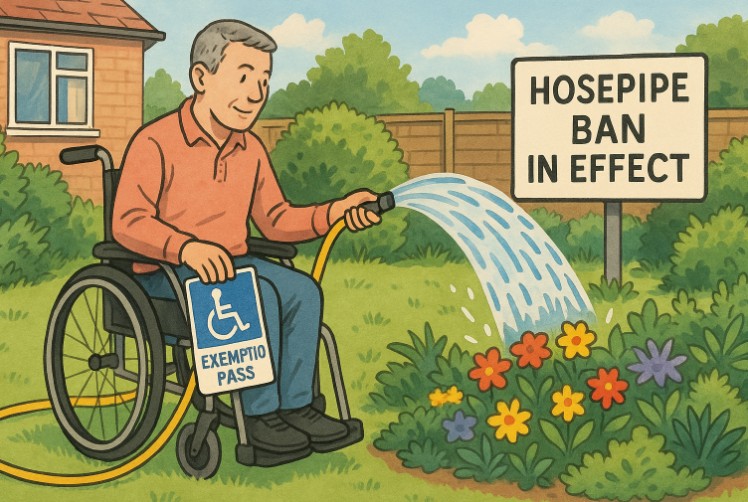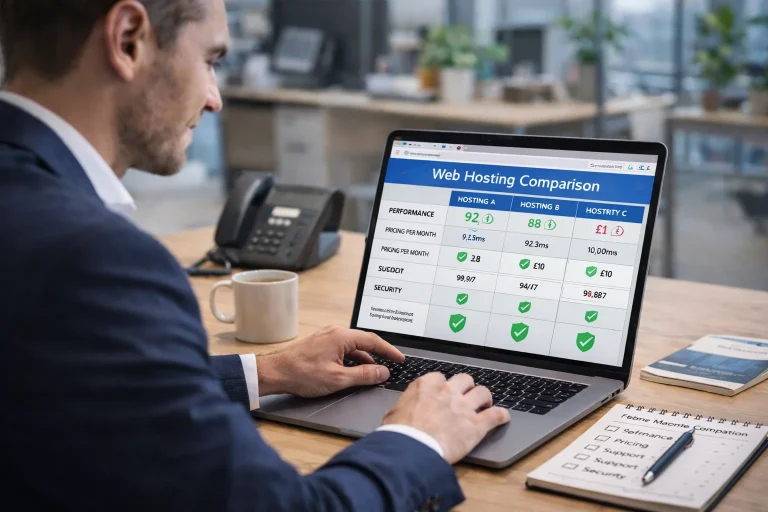In the UK, hosepipe bans are becoming more frequent due to rising water demand and ongoing periods of drought.
These bans are crucial for conserving water during dry spells, but they raise questions about how they affect vulnerable groups particularly Blue Badge holders and others with disabilities.
This blog explores whether Blue Badge holders are exempt from hosepipe bans, what the law says, and how to navigate these restrictions without compromising on essential needs.
What Is a Hosepipe Ban and Why Is It Enforced in the UK?
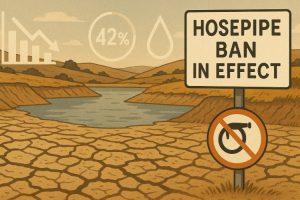
A hosepipe ban, formally called a Temporary Use Ban (TUB), is a legal restriction imposed by water suppliers during periods of low rainfall and high water consumption.
Its main purpose is to preserve water for essential uses such as drinking, hygiene, and supporting vulnerable populations.
The UK has seen a surge in these bans due to increasingly dry weather patterns. In spring 2025, England recorded its second driest season, leading several regions to impose strict water use controls.
These bans limit the use of hosepipes for activities deemed non-essential to help ensure adequate supply levels are maintained across homes and public services.
Who Imposes Hosepipe Bans and Where Are They Currently Active?
Hosepipe bans are issued and enforced by individual water companies based on supply conditions and drought management plans. They typically cover residential use but may extend to commercial sectors depending on severity.
As of July 2025, the following companies and regions have active hosepipe bans:
| Water Company | Start Date | Areas Affected |
| Southern Water | 21 July 2025 | Hampshire, Isle of Wight |
| Thames Water | 22 July 2025 | Swindon, Gloucestershire, Oxfordshire, Berkshire |
| South East Water | 18 July 2025 | Kent, Sussex |
| Yorkshire Water | 11 July 2025 | Yorkshire, North Lincolnshire, parts of Derbyshire |
Each water company has outlined its ban rules and exemptions on their official websites.
What Are the General Rules and Restrictions During a Hosepipe Ban?
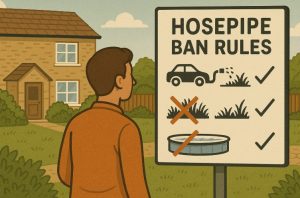
Hosepipe bans are implemented to curb non-essential water use when supply is critically low. These rules are designed to conserve resources without compromising the water needs of vulnerable populations.
Activities Typically Restricted
The use of hosepipes connected to the mains supply is restricted for the following purposes:
- Watering private gardens or lawns
- Cleaning private vehicles, caravans, or boats
- Washing windows, walls, patios, or outdoor furniture
- Filling or maintaining swimming pools, paddling pools, or hot tubs
- Cleaning driveways or outdoor paths
- Filling garden ponds unless they contain fish or aquatic animals
These restrictions apply to residential properties unless otherwise exempt. The goal is to prioritise water for essential domestic use, healthcare, sanitation, and the needs of vulnerable individuals.
Water Use That Is Still Permitted
Some water-related activities remain permitted during a ban, especially when they do not involve the use of a hosepipe connected to mains water:
- Watering plants using a watering can or bucket
- Using drip irrigation systems that are not handheld and have pressure regulators and timers
- Cleaning with rainwater harvested in water butts
- Using grey water (e.g., from baths or washing machines) for garden maintenance
- Filling ponds necessary for animal welfare
These alternatives offer practical ways for households to maintain essential outdoor care without violating the hosepipe ban rules.
Legal Framework and Enforcement
Hosepipe bans are governed under the Water Industry Act 1991. Each water company is authorised to issue a Temporary Use Ban in times of water scarcity. Violations of these bans can lead to financial penalties:
- Fines of up to £1,000 can be imposed
- Water companies may issue warnings for first-time offenders
- Repeat violations may prompt formal investigations or inspections
Consumers are encouraged to check their water provider’s specific rules to avoid penalties and ensure they are acting within legal boundaries.
Are Blue Badge Holders and Disabled People Exempt from Hosepipe Bans?
Most water companies recognise that certain individuals, including Blue Badge holders and those with medical or mobility needs, may require additional water access. As a result, exemptions are available for those who qualify, especially if:
- The individual is registered as disabled or holds a Blue Badge
- The person is on the water company’s Priority Services Register
- The water use supports health, accessibility, or independence
These exemptions may allow hosepipe use for essential gardening, mobility support, or other necessary household tasks. However, registration with the relevant provider is usually required to validate the exemption.
Which Water Companies Offer Exemptions for Disabled or Vulnerable Individuals?
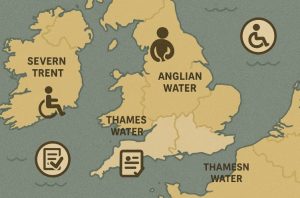
Each major water company outlines specific exemption rules on their website. The criteria for exemption are largely similar but may differ slightly in execution. Here’s how four major suppliers handle this:
| Provider | Exemptions for Blue Badge Holders | Registration Required | Additional Conditions |
| Southern Water | Yes | Yes | Must be on Priority Services Register |
| Thames Water | Yes | Yes | Hose use allowed if linked to disability needs |
| South East Water | Yes | Yes | Documentation may be requested |
| Yorkshire Water | Yes | Yes | Applied case-by-case via their support team |
Customers are encouraged to proactively join the Priority Services Register and provide supporting documents when necessary to ensure access to these exemptions.
How Can People With Disabilities Still Care for Their Gardens During a Ban?
Gardening is not only a leisure activity but also a therapeutic and essential aspect of home life for many people with disabilities. Hosepipe bans can create obstacles, but provisions are in place to ensure accessibility and independence are maintained.
Exemptions for Blue Badge Holders and Disabled Individuals
Water companies acknowledge that some people need continued access to hosepipes for essential garden maintenance related to mobility or health. Those who qualify for exemptions typically include:
- Individuals with a registered disability or Blue Badge
- People on the Priority Services Register maintained by water suppliers
- Households where garden maintenance supports medical or mental health
In most cases, users must register with their water provider and may need to provide documentation or a support letter from a healthcare professional.
Approved Methods for Garden Care Under a Ban
Even when not exempt, individuals with limited mobility or physical ability can still manage their gardens using alternative methods that comply with regulations. These include:
- Drip irrigation systems: Automatically water plants at the roots and are allowed if properly fitted with timers and regulators
- Watering cans and buckets: While labour-intensive, these remain permitted under all restrictions
- Rainwater harvesting: Water butts can be used to collect and reuse rainwater
- Grey water recycling: Household waste water from baths or washing machines can be reused for watering non-edible plants
Some local councils or charities offer assistance programmes to help disabled individuals with these tasks, ensuring they are not disadvantaged during a ban.
Assistance and Support Options
Disabled individuals who struggle to manage their gardens during restrictions can also seek help from:
- Registered carers or home support workers
- Family members or neighbours willing to help maintain the property
- Local authority welfare teams, which may offer short-term aid for outdoor maintenance
- Disability charities such as Scope or Age UK, which sometimes provide support or connect users to trusted gardening services
These options ensure that no one is left without the means to care for their home environment during water use restrictions.
What Alternatives to Hosepipes Are Allowed During a Ban?
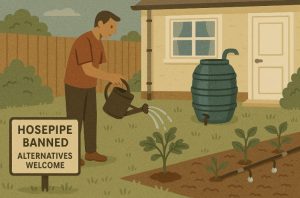
During a hosepipe ban, the use of hosepipes connected to mains water is strictly limited. However, several alternative methods are permitted for essential outdoor maintenance, especially for those not covered by exemption rules. These alternatives allow households to continue caring for their gardens and outdoor spaces while complying with legal restrictions.
Watering Cans and Buckets
One of the simplest and most accessible methods, watering cans and buckets remain fully allowed under hosepipe bans. They are ideal for:
- Watering small garden beds, flowers, or vegetable patches
- Keeping newly planted trees or shrubs hydrated
- Conserving water by controlling the amount used more precisely
Although physically demanding, this method is highly efficient and promotes careful water use. It is particularly suitable for smaller garden spaces.
Drip or Trickle Irrigation Systems
Drip irrigation systems provide a more automated solution and are permitted during a ban, provided they meet specific criteria:
- They must not be handheld at any time
- The system must include a pressure-reducing valve
- A timer must be installed to control water flow and usage duration
These systems deliver water directly to plant roots, minimising evaporation and surface runoff. This makes them ideal for maintaining crops, flower beds, and large garden areas without violating regulations.
Rainwater Harvesting Systems
Collecting rainwater in water butts or storage tanks is a highly sustainable and encouraged alternative. Rainwater harvesting is exempt from hosepipe bans because it does not involve mains water.
Key benefits include:
- Free and eco-friendly source of water
- Can be used with watering cans or gravity-fed irrigation systems
- Helps reduce demand on the mains supply during dry periods
Installing a water butt under a downpipe is relatively inexpensive and can provide hundreds of litres of water during wetter months, to be stored for drier periods.
Grey Water Recycling
Grey water refers to lightly used household water from sources like:
- Baths
- Showers
- Washing machines (excluding water with harsh chemicals)
- Kitchen sinks (non-greasy, detergent-free water)
This water can be reused in the garden during a hosepipe ban, particularly for watering ornamental plants or lawns. It’s advisable to:
- Avoid using grey water on edible crops unless filtered
- Rotate watering areas to prevent salt or detergent build-up in soil
- Let water cool before using it outdoors
Grey water systems can be as simple as collecting water in buckets, or as advanced as using installed recycling units that pump and filter used water directly into outdoor irrigation systems.
Private Boreholes and Wells
Water sourced from private boreholes, wells, or other non-mains supplies is not subject to hosepipe bans. Individuals or properties with access to such sources may continue using hosepipes without penalty, as long as their usage complies with local abstraction licences and regulations.
It’s worth noting:
- Overuse can affect local groundwater levels
- Permissions may be needed from the Environment Agency for high-volume use
This option is generally more viable for rural properties, agricultural operations, or homes with established private infrastructure.
Shared or Community Alternatives
Some local communities offer shared access to rainwater tanks or volunteer gardening assistance. This may include:
- Allotment sites with rainwater collection
- Gardening clubs that organise group watering sessions using approved systems
- Community centres distributing recycled water to vulnerable residents
These initiatives not only help with compliance but also foster sustainable practices and community engagement during periods of drought.
How Are Hosepipe Bans Enforced and What Are the Penalties?
In the UK, enforcement of hosepipe bans lies with each water supplier. Companies may carry out monitoring through various channels:
- Reports from neighbours or members of the public
- Water usage tracking through digital meters
- On-site visits and inspections where complaints are persistent
Failure to comply with hosepipe ban regulations, unless exempt, can result in financial penalties. Offenders may be fined up to £1,000 under the Water Industry Act 1991. While first-time infractions are often met with warnings, repeat or deliberate misuse is more likely to attract fines.
Will There Be More Hosepipe Bans This Year in the UK?

The likelihood of further restrictions depends heavily on weather patterns. Forecasts by the Environment Agency and Met Office suggest continued dry spells, particularly across southern and eastern England, which remain vulnerable to drought.
Although some regions have experienced brief rainfall, it is not enough to recharge aquifers and reservoirs. If dry conditions persist, water companies may expand bans to additional areas or extend existing ones into late summer and autumn.
When Will the Current Hosepipe Bans Likely End?
Water companies have stated that bans will remain in place until sufficient water levels return. This decision depends on several variables, including weather conditions, customer usage, and reservoir replenishment rates.
A summary of company responses to the expected end date is below:
| Water Company | Expected End of Ban |
| Southern Water | “As soon as water levels allow” |
| Thames Water | “Dependent on prolonged, significant rainfall” |
| South East Water | “When demand and supply stabilise” |
| Yorkshire Water | “Likely to remain in place until winter” |
Customers are encouraged to continue monitoring their supplier’s official channels for the most up-to-date information.
Concluison
FAQs About Hosepipe Ban Exemptions and Blue Badge Holders
Can Blue Badge holders register for automatic exemption during a hosepipe ban?
No, exemptions are not automatic. Blue Badge holders must typically register with their local water company’s Priority Services Register to qualify.
Is there a central list of exemption rules across all UK water companies?
No, each water company has its own set of rules. Always check your provider’s website for specific guidance.
Do hosepipe ban exemptions apply to carers of disabled individuals?
Yes, if the water use is essential for the person they care for and the carer is acting on their behalf, exemptions may apply.
Are drip irrigation systems allowed during a hosepipe ban?
Yes, as long as they are not handheld and include a pressure-reducing valve and timer.
How can I check if my area is under a hosepipe ban?
Visit your water company’s official website or use online postcode checkers available on government or local news platforms.
Do exemptions apply to private gardeners hired by disabled people?
If the gardening is essential for the wellbeing of a disabled person and meets the exemption criteria, then it can be allowed.
Can water butts and grey water systems be used legally during a ban?
Yes, as they do not use mains water. However, they should still be used responsibly to avoid waste.

